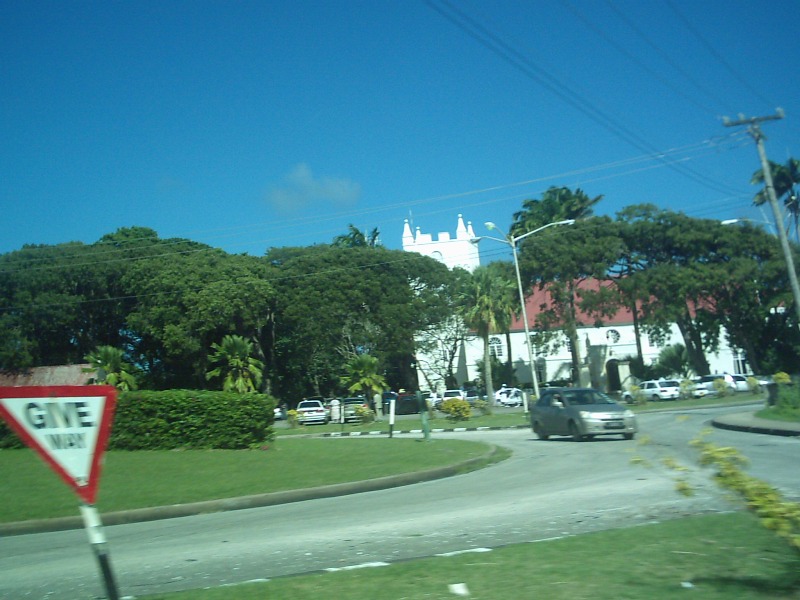This party-switching or crossing the floor has taken place in the Parliamentary System of Government in Barbados in the past and most recently in this 21st Century. In Barbadian politics, crossing the floor means to leave one's political party and join another, or in more general sense, to vote against one's own party. Party-switching is the term most used in American politics, and means any change in party affiliation of a partisan public figure, usually one who is currently holding elected office; and connotes a transfer of held power from one party to another. In the United States' dominant two-party system, the switches generally occur between the Republican Party and the Democratic Party, although the archives have revealed that there have also been a number of notable switches to and from third parties, and even between third parties. Documented party switchers in modern era politics of the United States show that the majority of switchers came from the Democratic Party to the Republican Party in the deep South. In New England, the Great Lakes states, and the coastal states switched from Republican Party to the Democratic Party.
Why do politicians abandon their loyalty even though they expect such from voters? When we look at the behavior of global political establishments their politicians behave in similar fashion as far as crossing the floor or party switching. Crossing the floor originated from the British House of Commons which is configured with the Government and Opposition facing each other on rows of benches as shown in the graphic image below.
Government Members Opposition Members
If a politician wishes to vote against the affiliated party that politician would need to literally cross the floor to get to the other lobby and if the Member of Parliament was to switch a party that MP would need to cross the floor.
Politicians who cross the floor or switch parties would have the populace believe that they did so from an ethical obligation, because they feel their views are no longer aligned with those of their current party. Some politicians cross the floor or switch their party for an opportunistic reason but they wouldn’t say it that way. The opportunistic politician usually belongs to a minority party and would cross the floor to join the majority party to gain the advantages of belonging to such a party. However, the most important reason why politicians switch or ditch their party is “to get elected". In your neck of the woods I'm sure you know or read about politicians who have crossed the floor or have switched their parties. In British political history, Winston Churchill crossed the floor from the Conservative Party to the Liberal Party then crossed back to the Conservative Party.
That being said, I tend to believe that politicians share common characteristics: they expect absolute loyalty from voters at the polls, and think ceaselessly about the next election cycle. An example of a notable switch in Barbadian politics is Sir Errol Walton Barrow for much nobler causes, for which his legacy has given much reasons to rejoice as we celebrate forty-four year of Independence. His legacy has peeled away the narcissistic clock that tends to dog politicians for a true Statesmanship robe. We are so very proud of the contributions made by the "Father of our Independence". His stewardship has revealed, that as an elected officer, he fervently thought about the generations to come, and placed certain mechanisms in place which the now generations enjoy, and for which previous generations had no such good fortune. A fixation on the next election cycle was not his forte and that showed the true mark of a statesman; the highest rank in the political arena. Sir Errol Walton Barrow, the statesman did this as he captained the "Ship of State" during his lifetime.
This crossing of the floor phenomenon provided the inspiration to write these two poems "Dems Bees” and "Yes, Yes, Yes”. The composition took place in the parish of St James South, Barbados on September 15, 2007 during the 'silly season' when Barbadians were gearing up for their General Election show down by the Barbados Labour Party (The Bees), the Barbados Democratic Party (The Dems) and the Peoples Progressive Party (PeePeePee). In my bag of "constrained writing" you would have read alphabetic poetry written in forms such as the Acrostic, Abecedarian, Diastic, Mesostich, and Telestich. This latest insertion in the bag of "constrained writing" takes the form of Univocalic poetry. Of course, there are many other forms of constrained writing in poetry but the comments here only touched on a few such types. So what is constrained writing.
Constrained writing is a literary technique in which the writer is bound by some condition that forbids certain things or imposes a pattern. This technique is very popular in poetry which often requires the poet to use a particular verse form.
The language of English has five vowels: a e i o u. I'm thinking now of a special type of constrained poetic writing that uses only one vowel-letter, i.e. only uses one of these vowels: a e i o u. It is called Univocalic Poetry. C C Bombaugh in 1890 wrote one of the best known Univocalic that used only the vowel "o". Here is an excerpt from Bombaugh's poetry:
No cool monsoon bow on Oxford dons,
Orthodox, jog-trot, bookworm Solomons
Eunoia is Univocalic poetry written by the Canadian poet, Christian Bok. This poetry book emerged at the beginning of the 21st Century. In Chapter I for Dick Higgins all the lines use only the vowel "i" as shown in the excerpt below.
Writing is inhibiting. Sighing, I sit, scribbling in Ink
This pidgin script. I sing with nihilistic witticism,
Disciplining signs with trifling gimmicks - impish
Hijinks which highlight stick sigils. Isn't it glib?
The poems, "Dems Bees" and “Yes Yes Yes" are Univocalic poetry that make use only of the vowel "e" that jabs at Barbadian politics.


